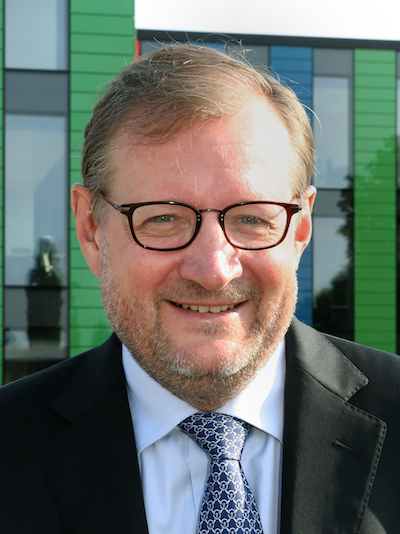Go to
Karl Aberer
Open Science
The digital revolution affects in many ways how science will work in the future and how science will interact with the society. As scientific endeavours are getting increasingly complex, collaboration among scientists supported by digital tools will become primordial. We see this happening in large projects (e.g. physics, astronomy, life science), but also in less expected disciplines, such as math. Tools will be helping scientist to collaborate more efficiently, and to tackle problems that are simply too complex for an individual, as well as help to organise scientific knowledge in a collaborative approach. Science will however also open to society and interact in various ways with it. Data science is already democratising, as illustrated by Kaggle, citizen science implies interested individuals into scientific research, education and research in the online space start to merge, and science will have an increasing impact on the discussion of important societal discussions, as the climate change debate illustrates. The main statement is that future science will be opening science in many ways. Opening to much deeper collaboration among science groups and science communities, as well as opening to other actors in society.
About the panel speaker:
 Karl Aberer is a full professor for Distributed Information Systems at EPFL Lausanne, Switzerland, since 2000. His research interests are on decentralization and self-organization in information systems with applications in peer-to-peer search, semantic web, trust management and mobile and sensor networks. Karl Aberer received his Ph.D. in mathematics in 1991 from the ETH Zürich. From 1991 to 1992 he was postdoctoral fellow at the International Computer Science Institute (ICSI) at the University of California, Berkeley. In 1992 he joined the Integrated Publication and Information Systems institute (IPSI) of GMD in Germany, where he was leading the research division Open Adaptive Information Management Systems. From 2005 to 2012 he was the director of the Swiss National Research Center for Mobile Information and Communication Systems (NCCR-MICS, www.mics.ch). Since September 2012 he is Vice-President of EPFL responsible for information systems. He is member of the editorial boards of VLDB Journal, ACM Transaction on Autonomous and Adaptive Systems and World Wide Web Journal. He has also been consulting for the Swiss government in research and science policy as a member of the Swiss Research and Technology Council (SWTR) from 2004 to 2011.
Karl Aberer is a full professor for Distributed Information Systems at EPFL Lausanne, Switzerland, since 2000. His research interests are on decentralization and self-organization in information systems with applications in peer-to-peer search, semantic web, trust management and mobile and sensor networks. Karl Aberer received his Ph.D. in mathematics in 1991 from the ETH Zürich. From 1991 to 1992 he was postdoctoral fellow at the International Computer Science Institute (ICSI) at the University of California, Berkeley. In 1992 he joined the Integrated Publication and Information Systems institute (IPSI) of GMD in Germany, where he was leading the research division Open Adaptive Information Management Systems. From 2005 to 2012 he was the director of the Swiss National Research Center for Mobile Information and Communication Systems (NCCR-MICS, www.mics.ch). Since September 2012 he is Vice-President of EPFL responsible for information systems. He is member of the editorial boards of VLDB Journal, ACM Transaction on Autonomous and Adaptive Systems and World Wide Web Journal. He has also been consulting for the Swiss government in research and science policy as a member of the Swiss Research and Technology Council (SWTR) from 2004 to 2011.
Secondary navigation
- EPFL Workshop on Logic Synthesis and Emerging Technologies
- Luca Amaru
- Luca Benini
- Giovanni De Micheli
- Srini Devadas
- Antun Domic
- Rolf Drechsler
- Pierre-Emmanuel Gaillardon
- Jie-Hong Roland Jiang
- Akash Kumar
- Shahar Kvatinsky
- Yusuf Leblebici
- Shin-ichi Minato
- Alan Mishchenko
- Vijaykrishnan Narayanan
- Ian O'Connor
- Andre Inacio Reis
- Martin Roetteler
- Julien Ryckaert
- Mathias Soeken
- Christof Teuscher
- Zhiru Zhang
- Symposium on Emerging Trends in Computing
- Layout synthesis: A golden DA topic
- EPFL Workshop on Logic Synthesis & Verification
- Luca Amaru
- Luca Benini
- Robert Brayton
- Maciej Ciesielski
- Valentina Ciriani
- Jovanka Ciric-Vujkovic
- Jason Cong
- Jordi Cortadella
- Giovanni De Micheli
- Antun Domic
- Rolf Drechsler
- Henri Fraisse
- Paolo Ienne
- Viktor Kuncak
- Enrico Macii
- Igor Markov
- Steven M. Nowick
- Tsutomu Sasao
- Alena Simalatsar
- Leon Stok
- Dirk Stroobandt
- Tiziano Villa
- Symposium on Emerging Trends in Electronics
- Raul Camposano
- Anantha Chandrakasan
- Jo De Boeck
- Gerhard Fettweis
- Steve Furber
- Philippe Magarshack
- Takayasu Sakurai
- Alberto Sangiovanni-Vincentelli
- Ken Shepard
- VENUE
- Panel on Circuits in Emerging Nanotechnologies
- Panel on Emerging Methods of Computing
- Panel on The Role of Universities in the Emerging ICT World
- Panel on Design Challenges Ahead
- Panel on Alternative Use of Silicon
- Nano-Bio Technologies for Lab-on-Chip
- Functionality-Enhanced Devices Workshop
- More Moore: Designing Ultra-Complex System-on-Chips
- Design Technologies for a New Era
- Nanotechnology for Health
- Secure Systems Design
- Surface Treatments and Biochip Sensors
- Security/Privacy of IMDs
- Nanosystem Design and Variability
- Past Events Archive

